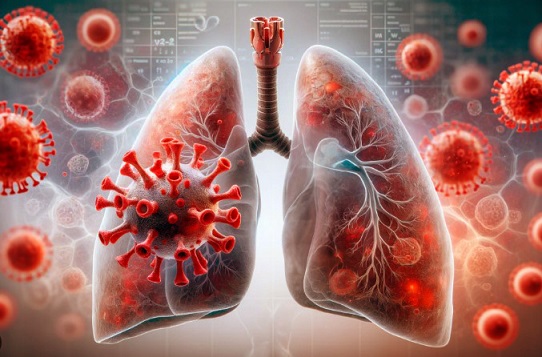Nikhil Prasad Fact checked by:Thailand Medical News Team Sep 18, 2025 4 months, 2 weeks, 1 day, 17 hours, 47 minutes ago
Medical News: A Natural Defense Protein Comes into Focus
Scientists in Brazil and Canada have uncovered an important role played by a protein called Annexin A1 in protecting the lungs from the deadly inflammation triggered by coronavirus infections. The research team, from the Federal University of Minas Gerais (Brazil) and Université Laval in Quebec, Canada, showed that this natural protein can calm overactive immune responses in the lungs without interfering with the body’s ability to fight off the virus. This
Medical News report reveals findings that could one day reshape how severe COVID-19 is treated.
 New Hope as Protein Annexin A1 Found to Shield Lungs from COVID-19 Inflammation
How Annexin A1 Works Against Inflammation
New Hope as Protein Annexin A1 Found to Shield Lungs from COVID-19 Inflammation
How Annexin A1 Works Against Inflammation
Inflammation is the body’s way of fighting infections, but in severe COVID-19 it often goes into overdrive, damaging lung tissue and increasing the risk of death. Annexin A1 acts like a brake on this runaway immune reaction. In experiments using mice infected with coronaviruses, researchers found that levels of Annexin A1 increased in inflamed areas of the lungs. Mice lacking the protein showed far worse inflammation, with heavier infiltration of immune cells such as neutrophils and greater lung damage.
A Promising Treatment with Ac2-26
To test whether Annexin A1 could be used as a therapy, the team turned to a small synthetic copy of the protein called Ac2-26. When given to mice infected with SARS-CoV-2, the peptide reduced lung damage and increased survival rates. Remarkably, the protection provided by Ac2-26 was on par with the antiviral drug Remdesivir. Even more importantly, Ac2-26 did not weaken the body’s ability to control viral replication, meaning it worked purely by calming harmful inflammation.
Findings Compared with Standard Antiviral Drugs
The scientists also tested whether combining Ac2-26 with Remdesivir would improve results. While the mix did not offer much more benefit than using either drug alone, it did confirm that Ac2-26 works differently—by targeting inflammation rather than the virus itself. This suggests the peptide could become a powerful add-on treatment, especially in patients where inflammation is the main threat.
Why This Matters
The discovery is especially important because many COVID-19 deaths are linked not only to viral load but also to overwhelming immune responses that damage the lungs. By focusing on the body’s own inflammatory processes, Ac2-26 and similar drugs may one day help patients survive severe infections without suppressing the entire immune system. The research shows that host-targeted therapies—treatments that help the body balance its response rather than just attack the virus—may be the key to managing future pandemics.
Conclusion
These findings highlight Annexin A1 as a natural safeguard against coronavirus-driven lung damage. The experimental drug Ac2-26 demonstrat
ed the ability to reduce inflammation, protect lung tissue, and save lives in infected mice, performing as well as one of the leading antivirals. Although more research is needed before human trials, the study opens a promising path for therapies that work with the body rather than against it. If confirmed in people, such treatments could transform the way severe COVID-19 and future viral threats are managed.
The study findings were published in the peer reviewed journal: Clinical Science.
https://portlandpress.com/clinsci/article/doi/10.1042/CS20255801/236554/Annexin-A1-as-a-key-modulator-of-lung-inflammation
For the latest COVID-19 News, keep on logging to Thailand
Medical News.
Read Also:
https://www.thailandmedical.news/news/breaking-french-study-reveals-that-sars-cov-2-proteins-e-and-orf-3a-are-not-viroporins-as-previously-claimed-but-are-inducers-of-pannexin-currents
https://www.thailandmedical.news/news/annexin-a2-as-a-biomarker-and-therapy-target-for-digestive-system-cancers
https://www.thailandmedical.news/news/french-researchers-uncover-that-annexin-v-positive-extracellular-vesicles-could-be-promising-biomarkers-of-severe-covid-19-disease
